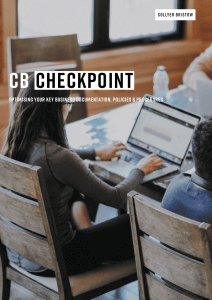
The Team
Our lawyers have the expertise and experience to provide you with creative, personalised solutions in a clear and understandable way.
Our Publications
Discover a wealth of invaluable guidance in the form of guides and brochures written by our expert lawyers.
Your IP Rights Health Check
Are you certain your business’ IP rights are protected?
About
How to protect your database?
A database can be protected in three different ways under English law:
- copyright can protect literary and artistic works including tables and compilations that form part of a database, if they are original works
- copyright can protect the structure of a database, if it is an original literary work. There must be effort spent on the selection and arrangement of the data and sufficient judgment and skill exercised in the process to make the work the author’s own intellectual creation
- the Copyright and Rights in Databases Regulations 1997 (the “Regulations”) can protect the data in the database if the database is the result of substantial investment in obtaining, verifying or presenting its contents.
What is a database?
The Regulations define a database as a “collection of independent works, data or other materials arranged in a systematic or methodical way and individually accessible by electronic or other means.” This is a wide definition. It will cover most mailing lists, customer lists, telephone directories and other collections of information, whether they are electronic or manual paper-based systems.
A database will qualify for protection as a Database Right if there has been a “substantial investment in obtaining, verifying or presenting the contents of the database.” The investment may be financial, human or technical. However, establishing that there has been a substantial investment in the database can be a complex exercise, especially if the information was compiled haphazardly over a period of time.
Under the Regulations it’s the investment in assimilating the database that qualifies it for protection, rather than the information in the database. The contents of the database do not have to be secret or even valuable to qualify for Database Rights. As such, the Regulations offer helpful protection against wrongdoing where the contents are not classified as confidential, or where there may be doubts whether copyright exists in the content or the selection and arrangement of the data, or whether such copyright has been infringed.
How are database rights infringed?
A person infringes a Database Right if they extract or re-utilise all or a substantial part of the contents of a database without the owner’s consent. Re-utilisation means making the contents available to the public, for example, by distributing copies or putting them online.
Actions such as decompiling or reverse engineering a database in order to recreate it can also be deemed an infringement. Remedies for infringement of Database Rights broadly follow those available for copyright infringement i.e. damages, injunctions and orders for delivering up (returning) the infringing material.
How we can help you
As the summary above indicates, rights in Databases are highly technical. The best way to protect them is to look at the issue holistically and in parallel with other possible legal options, which may be contractual or based on copyright.
As a full-service Intellectual Property team, our database rights experts can help you:
- Determine what rights exist in a database and who owns them
- Maximise the protection of your rights, both legally and commercially
- Take swift, decisive action if your database has been breached and copied
- Defend you if someone else claims that you have infringed their rights in a database
Patrick WheelerPartner - Head of IP & Data Protection
+44 20 7470 4432+44 7786 962089patrick.wheeler@collyerbristow.com
Spotlight
E-Commerce Agreements
As the opportunities for digital businesses grow, so does the legislation. E-commerce regulations, distance selling regulations, consumer protection from unfair trading, electronic marketing regulations, GDPR and their international equivalents – all these regulations need to be complied with before you can sell online.
We specialise in helping businesses navigate the complex area of e-commerce law, including the additional complexities associated with operating your businesses in foreign countries over the web. Our advice includes:
- Website and mobile app development agreements
- Hosting agreements
- IT services contracts
- Software licence agreements
- Terms and conditions of sale to consumers, including cooling-off periods and cancellation
- Website terms of use
- Protecting intellectual property on the site (images, content, artwork)
- Privacy and cookies policies
- Data processing agreements and agreements governing international transfers of personal data
- Contracting with overseas customers, clients and suppliers
- Compliance with industry-specific regulatory requirements, such as secondary ticketing for events
- Agreements for platforms acting as an online intermediary service
- Harmonisation between your terms of business and other commercial contracts, such as distribution agreements.
Our commercial solicitors have experience drafting all types of e-commerce agreements, with a thorough understanding of laws relating to online trading. Whatever your commercial objectives, we are confident we have a solution that achieves the dual goals of preserving the customer experience while ensuring your company is well protected from risk.
Quick glance: publications
Database rights Publications
CB Checkpoint: overview
There are a number of key policies, procedures and documents your business should keep up to date, to be both legally protected and in preparation for investment or exit. Our team will give your business a full check-over.
Database rights insights
News
Tribute to our Partner, Tim BamfordTribute to our Partner, Tim Bamford
Read more
Longer Reads
Regulators respond to government’s ‘pro-innovation approach to AI regulation’Regulators respond to government’s ‘pro-innovation approach to AI regulation’
Read more
Longer Reads
Does UK Copyright law provide adequate protection to creators of Generative AI artworks?Does UK Copyright law provide adequate protection to creators of Generative AI artworks?
Read more
Longer Reads
Manufacturing, printing technology and intellectual property rightsManufacturing, printing technology and intellectual property rights
Read more
Longer Reads
Copyright claims up in flames: Evans v John Lewis PLC and AnotherCopyright claims up in flames: Evans v John Lewis PLC and Another
Read more
Podcasts
The Ed Sheeran/Marvin Gaye copyright disputeThe Ed Sheeran/Marvin Gaye copyright dispute
Listen now
Longer Reads
Only time will tell if Damien Hirst’s art burning NFT stunt will pay offOnly time will tell if Damien Hirst’s art burning NFT stunt will pay off
Read more
Longer Reads
Copyright The Musical: A Tale of Broadway BlundersCopyright The Musical: A Tale of Broadway Blunders
Read more
Shorter Reads
No thank you for the music – ABBA sues ‘official’ tribute bandNo thank you for the music – ABBA sues ‘official’ tribute band
Read more
Shorter Reads
I Knew You Were Trouble – Taylor Swift re-records back catalogue in royalties rowI Knew You Were Trouble – Taylor Swift re-records back catalogue in royalties row
Read more
Shorter Reads
We don’t need another Tina – Tina Turner sues tribute actWe don’t need another Tina – Tina Turner sues tribute act
Read more
News
Collyer Bristow IP team recognised in The Times Best Law Firms 2022Collyer Bristow IP team recognised in The Times Best Law Firms 2022
Read more
You might also like
Need some more information? Make an enquiry below
Database rights key contacts
- Patrick
WheelerPartner - Head of IP & Data Protection
Talk to Patrick about Intellectual property disputes, Data protection, Digital, Intellectual property and Manufacturing
Database rights
Maximising the protection of your rights, both legally and commercially
Databases are becoming increasingly important and valuable assets for business. Steps should be taken to protect what you have compiled and prevent unauthorised copying and misuse.
The Team
Our lawyers have the expertise and experience to provide you with creative, personalised solutions in a clear and understandable way.
Our Publications
Discover a wealth of invaluable guidance in the form of guides and brochures written by our expert lawyers.
Your IP Rights Health Check
Are you certain your business’ IP rights are protected?
How to protect your database?
A database can be protected in three different ways under English law:
- copyright can protect literary and artistic works including tables and compilations that form part of a database, if they are original works
- copyright can protect the structure of a database, if it is an original literary work. There must be effort spent on the selection and arrangement of the data and sufficient judgment and skill exercised in the process to make the work the author’s own intellectual creation
- the Copyright and Rights in Databases Regulations 1997 (the “Regulations”) can protect the data in the database if the database is the result of substantial investment in obtaining, verifying or presenting its contents.
What is a database?
The Regulations define a database as a “collection of independent works, data or other materials arranged in a systematic or methodical way and individually accessible by electronic or other means.” This is a wide definition. It will cover most mailing lists, customer lists, telephone directories and other collections of information, whether they are electronic or manual paper-based systems.
A database will qualify for protection as a Database Right if there has been a “substantial investment in obtaining, verifying or presenting the contents of the database.” The investment may be financial, human or technical. However, establishing that there has been a substantial investment in the database can be a complex exercise, especially if the information was compiled haphazardly over a period of time.
Under the Regulations it’s the investment in assimilating the database that qualifies it for protection, rather than the information in the database. The contents of the database do not have to be secret or even valuable to qualify for Database Rights. As such, the Regulations offer helpful protection against wrongdoing where the contents are not classified as confidential, or where there may be doubts whether copyright exists in the content or the selection and arrangement of the data, or whether such copyright has been infringed.
How are database rights infringed?
A person infringes a Database Right if they extract or re-utilise all or a substantial part of the contents of a database without the owner’s consent. Re-utilisation means making the contents available to the public, for example, by distributing copies or putting them online.
Actions such as decompiling or reverse engineering a database in order to recreate it can also be deemed an infringement. Remedies for infringement of Database Rights broadly follow those available for copyright infringement i.e. damages, injunctions and orders for delivering up (returning) the infringing material.
How we can help you
As the summary above indicates, rights in Databases are highly technical. The best way to protect them is to look at the issue holistically and in parallel with other possible legal options, which may be contractual or based on copyright.
As a full-service Intellectual Property team, our database rights experts can help you:
- Determine what rights exist in a database and who owns them
- Maximise the protection of your rights, both legally and commercially
- Take swift, decisive action if your database has been breached and copied
- Defend you if someone else claims that you have infringed their rights in a database
Patrick WheelerPartner - Head of IP & Data Protection
View Patrick Wheeler's profileCécile de LagardeSenior Associate
View Cécile de Lagarde's profileCharles BraithwaitePartner
View Charles Braithwaite's profileMette Marie KennedySenior Associate
View Mette Marie Kennedy's profileNikhil VyasAssociate
View Nikhil Vyas's profileSPOTLIGHT
E-Commerce Agreementsopen
As the opportunities for digital businesses grow, so does the legislation. E-commerce regulations, distance selling regulations, consumer protection from unfair trading, electronic marketing regulations, GDPR and their international equivalents – all these regulations need to be complied with before you can sell online.
We specialise in helping businesses navigate the complex area of e-commerce law, including the additional complexities associated with operating your businesses in foreign countries over the web. Our advice includes:
- Website and mobile app development agreements
- Hosting agreements
- IT services contracts
- Software licence agreements
- Terms and conditions of sale to consumers, including cooling-off periods and cancellation
- Website terms of use
- Protecting intellectual property on the site (images, content, artwork)
- Privacy and cookies policies
- Data processing agreements and agreements governing international transfers of personal data
- Contracting with overseas customers, clients and suppliers
- Compliance with industry-specific regulatory requirements, such as secondary ticketing for events
- Agreements for platforms acting as an online intermediary service
- Harmonisation between your terms of business and other commercial contracts, such as distribution agreements.
Our commercial solicitors have experience drafting all types of e-commerce agreements, with a thorough understanding of laws relating to online trading. Whatever your commercial objectives, we are confident we have a solution that achieves the dual goals of preserving the customer experience while ensuring your company is well protected from risk.
Database rights Publications
Database rights insights
News
Tribute to our Partner, Tim BamfordTribute to our Partner, Tim Bamford
Read more
Longer Reads
Regulators respond to government’s ‘pro-innovation approach to AI regulation’Regulators respond to government’s ‘pro-innovation approach to AI regulation’
Read more
Longer Reads
Does UK Copyright law provide adequate protection to creators of Generative AI artworks?Does UK Copyright law provide adequate protection to creators of Generative AI artworks?
Read more
Longer Reads
Manufacturing, printing technology and intellectual property rightsManufacturing, printing technology and intellectual property rights
Read more
Longer Reads
Copyright claims up in flames: Evans v John Lewis PLC and AnotherCopyright claims up in flames: Evans v John Lewis PLC and Another
Read more
Podcasts
The Ed Sheeran/Marvin Gaye copyright disputeThe Ed Sheeran/Marvin Gaye copyright dispute
Listen now
Longer Reads
Only time will tell if Damien Hirst’s art burning NFT stunt will pay offOnly time will tell if Damien Hirst’s art burning NFT stunt will pay off
Read more
Longer Reads
Copyright The Musical: A Tale of Broadway BlundersCopyright The Musical: A Tale of Broadway Blunders
Read more
Shorter Reads
No thank you for the music – ABBA sues ‘official’ tribute bandNo thank you for the music – ABBA sues ‘official’ tribute band
Read more
Shorter Reads
I Knew You Were Trouble – Taylor Swift re-records back catalogue in royalties rowI Knew You Were Trouble – Taylor Swift re-records back catalogue in royalties row
Read more
Shorter Reads
We don’t need another Tina – Tina Turner sues tribute actWe don’t need another Tina – Tina Turner sues tribute act
Read more
News
Collyer Bristow IP team recognised in The Times Best Law Firms 2022Collyer Bristow IP team recognised in The Times Best Law Firms 2022
Read more
Need some more information? Make an enquiry below.
Message us on WhatsApp (calling not available)
Please note that Collyer Bristow provides this service during office hours for general information and enquiries only and that no legal or other professional advice will be provided over the WhatsApp platform. Please also note that if you choose to use this platform your personal data is likely to be processed outside the UK and EEA, including in the US. Appropriate legal or other professional opinion should be taken before taking or omitting to take any action in respect of any specific problem. Collyer Bristow LLP accepts no liability for any loss or damage which may arise from reliance on information provided. All information will be deleted immediately upon completion of a conversation.
Close























